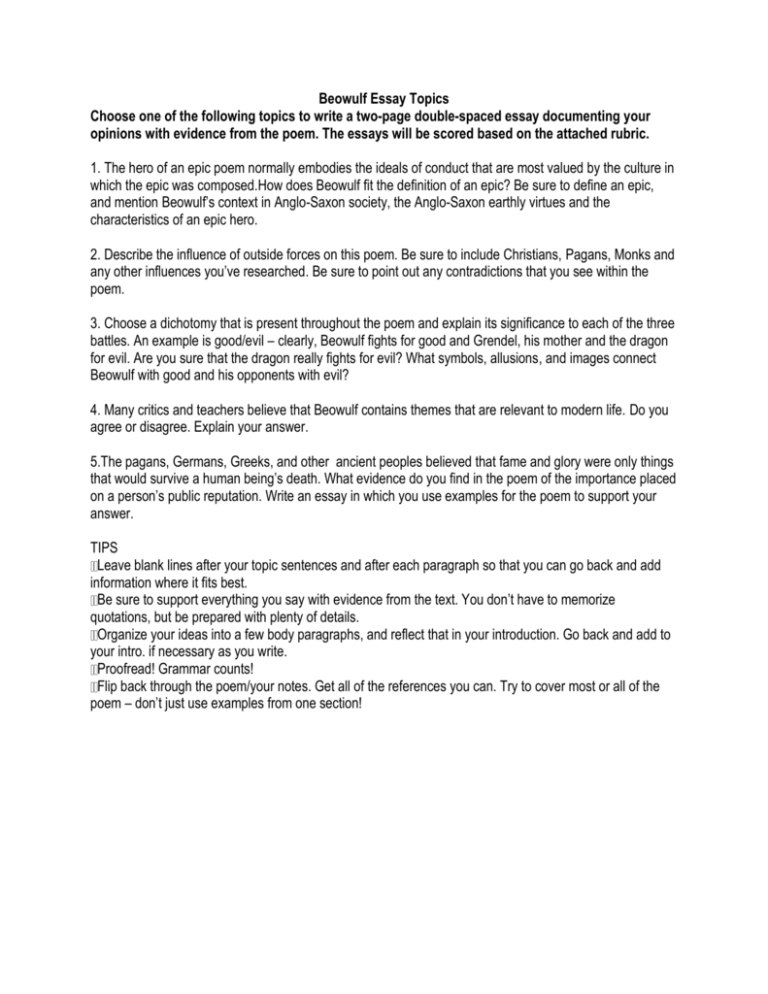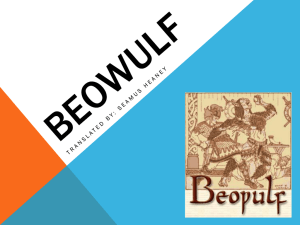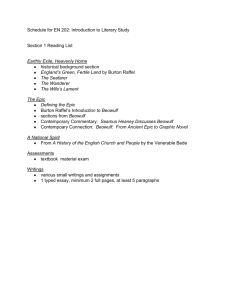File
advertisement

Beowulf Essay Topics Choose one of the following topics to write a two-page double-spaced essay documenting your opinions with evidence from the poem. The essays will be scored based on the attached rubric. 1. The hero of an epic poem normally embodies the ideals of conduct that are most valued by the culture in which the epic was composed.How does Beowulf fit the definition of an epic? Be sure to define an epic, and mention Beowulf’s context in Anglo-Saxon society, the Anglo-Saxon earthly virtues and the characteristics of an epic hero. 2. Describe the influence of outside forces on this poem. Be sure to include Christians, Pagans, Monks and any other influences you’ve researched. Be sure to point out any contradictions that you see within the poem. 3. Choose a dichotomy that is present throughout the poem and explain its significance to each of the three battles. An example is good/evil – clearly, Beowulf fights for good and Grendel, his mother and the dragon for evil. Are you sure that the dragon really fights for evil? What symbols, allusions, and images connect Beowulf with good and his opponents with evil? 4. Many critics and teachers believe that Beowulf contains themes that are relevant to modern life. Do you agree or disagree. Explain your answer. 5.The pagans, Germans, Greeks, and other ancient peoples believed that fame and glory were only things that would survive a human being’s death. What evidence do you find in the poem of the importance placed on a person’s public reputation. Write an essay in which you use examples for the poem to support your answer. TIPS Leave blank lines after your topic sentences and after each paragraph so that you can go back and add information where it fits best. Be sure to support everything you say with evidence from the text. You don’t have to memorize quotations, but be prepared with plenty of details. Organize your ideas into a few body paragraphs, and reflect that in your introduction. Go back and add to your intro. if necessary as you write. Proofread! Grammar counts! Flip back through the poem/your notes. Get all of the references you can. Try to cover most or all of the poem – don’t just use examples from one section! Sample Beowulf Essay: Topic 3 Dichotomy: Heaven/Hell The dichotomy of Heaven and Hell is found throughout the poem Beowulf. It reflects the blending of cultures faced by the Anglo-Saxons as well as the influence of Christian monks on an essentially Pagan poem. It further serves to characterize Grendel, Beowulf, the Geats and the Danes. In “The Wrath of Grendel”, the monster is described as living in “darkness”, often a metaphor for Hell. He is also separated from the society of warriors at Herot. This is significant for two reasons. First, it allies him with the Biblical character of Cain, who was exiled as a murderer and apparently marked by God physically. Grendel, too, is physically different from the Danes, and it is because of his crimes that he cannot be part of their community. This suggests that Grendel is exiled from Heaven as Cain was exiled from Eden, or the presence of God and man. The second way in which Grendel’s aloneness is significant is that the Hebrew version of Hell, Sheol, is really defined as a cold, dark place where the dead are separated from God and from the living. This relates directly to Grendel’s marsh area, which is described as “a hell, not Hell but Earth”. His lair is described in “The Monster’s Lair” as deep down, dark and having a hellish light around it. It is said to be so evil that it makes Heaven weep. Clearly, the poem establishes that Grendel is not going to enter Heaven. He is associated with “demons” and “fiends”, all Hellish creatures that are in eternal opposition to God and therefore excluded from Heaven. A kenning used to describe Grendel later in this part is “hell-forged hands”, suggesting that he was created in Hell. Grendel is said never to touch Hrothgar’s throne because it is protected by God. Grendel cannot know God’s love, so he is permanently exiled from Christian society according to the poem. It is not just Grendel who is characterized through the dichotomy of Heaven and Hell. When Grendel attacks the Danes, they turn to God for help. When the attacks continue, they turnto the old stone gods, “hoping for Hell’s support”. This was probably added by the Christian monks to demonstrate the link between Paganism and Hell; their additions to Beowulf often emphasize the superiority of Christianity as they saw it. The poem then gives a stern warning to those who do not trust God when trouble strikes, indicating that they will remain separated from God and spend the afterlife in Hell. The Geats are also shown focusing on Heaven after Beowulf’s death as they glorify him, using words like “praise” and “glory”. They seem to believe that he is in Heaven, whereas he most likely would not really have been Christian. Beowulf, too, is characterized in terms of Heaven and Hell. When he kills Grendel’s mother, a light, as bright as “Heaven’s own candle” (the sun), shines on him from no apparent source. This suggests that God blesses his destruction of the monster. This also happens after he and Wiglaf have won the treasure from the Dragon. The battle with the dragon consists of Beowulf coming through fire and flames that burn him, much like the common Christian concept of Hell. Later, as he is dying after the battle with the Dragon, he thanks God for the treasure, calling him the “Father in Heaven”, reminding readers that Beowulf will soon die and enter Heaven. As Beowulf is dying, Wiglaf sprinkles him with water, perhaps signifying baptism. When Beowulf dies, the poem says that his soul went to “glory” and was “on high”, both metaphors for Heaven. By sending Beowulf to Heaven when he dies, the monks who transcribed the poem are sending a message to their audience that Heaven awaits those who believe and live accordingly. PROJECTS The Epic Poem Project 1. Choose a hero. You can be your own hero, or you may choose a real person, but you must give your hero superhuman qualities like Beowulf. Your hero must meet all 4 criteria for an epic hero by the end and display Anglo- Saxon earthly virtues. 2. Beowulf is a symbol – he has a place in the epic, but also in the religion behind the epic. You should base your epic on a religious or philosophical world view and develop characters who are symbolic within that world view. Just as Beowulf (messiah), Grendel (devil) and Hrothgar and the Danes (church) are symbolic of Christian figures, your hero must represent his cultural and spiritual background. You can use your own religion or philosophy of life, or you may create one, but either way you must assume that I know nothing about it and attach a ½ page explanation of it and its use in your epic at the end of your project. 3. Your epic should have 5 parts similar in length to those in Beowulf. They should have descriptive titles as do those in Beowulf. There is no maximum length, only minimum – about 50 lines of a similar length to those in the book. 4. Your epic must contain at least 3 examples EACH of alliteration, assonance, caesura and kenning. You MUST highlight them. 5. You should include a cover page with illustrations and your title. 6. Any strong resemblance to another person’s work will result in a zero. * In the event of uneven numbers, a group of three may be formed or one person may work alone. In either case, each person must write 2 parts of an epic poem, and the project must contain all of the other requirements. Here are a few ideas: Beowulf put everyone else first, such as when he came to help Hrothgar without being asked. Appearance may be deceiving and people may change – remember when Hrothgar and his men change religion. Beowulf uses details and exaggeration to get your attention. Beowulf is divided into 3 main parts – one for each of Beowulf’s three battles. In Beowulf, there is a clear good side and evil side, and the good side is under attack. This inspires people to side with the hero. The Epic Poem Project: Grading Rubric 5 parts similar in length to Beowulf that fit the definition of an epic. 12345 ½ page explanation of worldview is attached and the hero clearly fits and represents this worldview throughout the poem. 12345 Contains all literary elements: Alliteration, Assonance, Kenning, Caesura (3 of each, highlighted). 12345 Cover page with illustrations is present, as are descriptive titles for each part. 12345 Hero meets requirements (4 characteristics of an Epic Hero and 4 Anglo-Saxon earthly virtues). 12345 TOTAL _________X4 ______/100 BONUS: You may only receive bonus once! _____ Performed musically for the class _____ Created additional visuals _____ Created and presented dramatic version to the class _____ Other (pre-approved): ______________________________ Grendel G’s Mother Dragon Glorified On a quest Ethical Strong Bravery Loyalty Generosity Friendship . Beowulf Project 1. Choose 3 themes from Beowulf. Ideas to get you started include reversal, heroism, humility, ethics, and questioning. 2. Write about each theme, citing examples from the text. Be detailed, thorough and specific. You may write 2+ paragraphs per theme, or you may create an outline for each. A good rule of thumb is 10+ examples per theme with explanations of their significance. Cover the entire text. See example (Note: example drawn from full version of poem with different line numbers). 3. Attach a visual to each theme. You may draw pictures, create a mix CD with 1 corresponding track per theme (and a print-out of edited & relevant lyrics), develop a creative performance for the class, or an idea of your own (run it by me first). 4. Choose 2 allusions from the epic and complete steps 2 & 3 for each. 5. Choose 1 character (excluding Beowulf) that you think is central to the story and identify his or her main trait. Ideas include Wiglaf or Welthow. Complete steps 2 & 3 for this character. 6. Any strong resemblance to someone else’s work will result in a zero on atleast that portion of the assignment. Sample Outline Format (no, you may not use this as one of your themes) THEME: Judgment Line # KEY WORD(S) RELATION TO THEME 21 banished … punished God judges Grendel as He did Cain, Grendel = murderer = judges by God 28 again defeated God’s judgment = repeated defeat 35 thoughts quick as claws Grendel doesn’t judge like humans/God – animalistic, irrational 65 sung in men’s ears men re-tell story, judge Grendel evil 100 no solace God judges those who turn from Him 130 bravely… welcome Wulfgar judges that Beowulf can see Hrothgar while wearing armor (Beowulf is important/respected) 169 Higlac would think B fears being judges unworthy 204 bought the end Hrothgar does not judge Edgetho 240 you … fool Unferth misjudges Beowulf 370 pleased with words Welthow judges Beowulf well 435 flooded with fear Reader judges Grendel – weak 542 warrior seemed worthier Men judge Beowulf honorably 556 stag with great horns deer judge lair too evil to enter 630 God gave judgment God is on B’s side 660 repaid B fulfils God’s judgment against Grendel & his mother 668 I would … B judges self, says not weak to use weapons 747 none came reader judges Geats for not helping B 751 a good man Wiglaf judged well 764 boasting Wiglaf judges Geats – weak, scared 808 lead my people B judges Wiglaf – worthy to rule 832 his greatness Geats judge B’s life, he was great Epic Project: Grading Rubric • Covers entire text and all parts of assignment. 12345 • Depth of thought is evident (Bloom’s Taxonomy). 12345 • Thorough development of each piece. 12345 • Sufficient original detail supports each piece. 12345 • Visuals are relevant and support each piece. 12345 TOTAL _________ X4 ______/100






